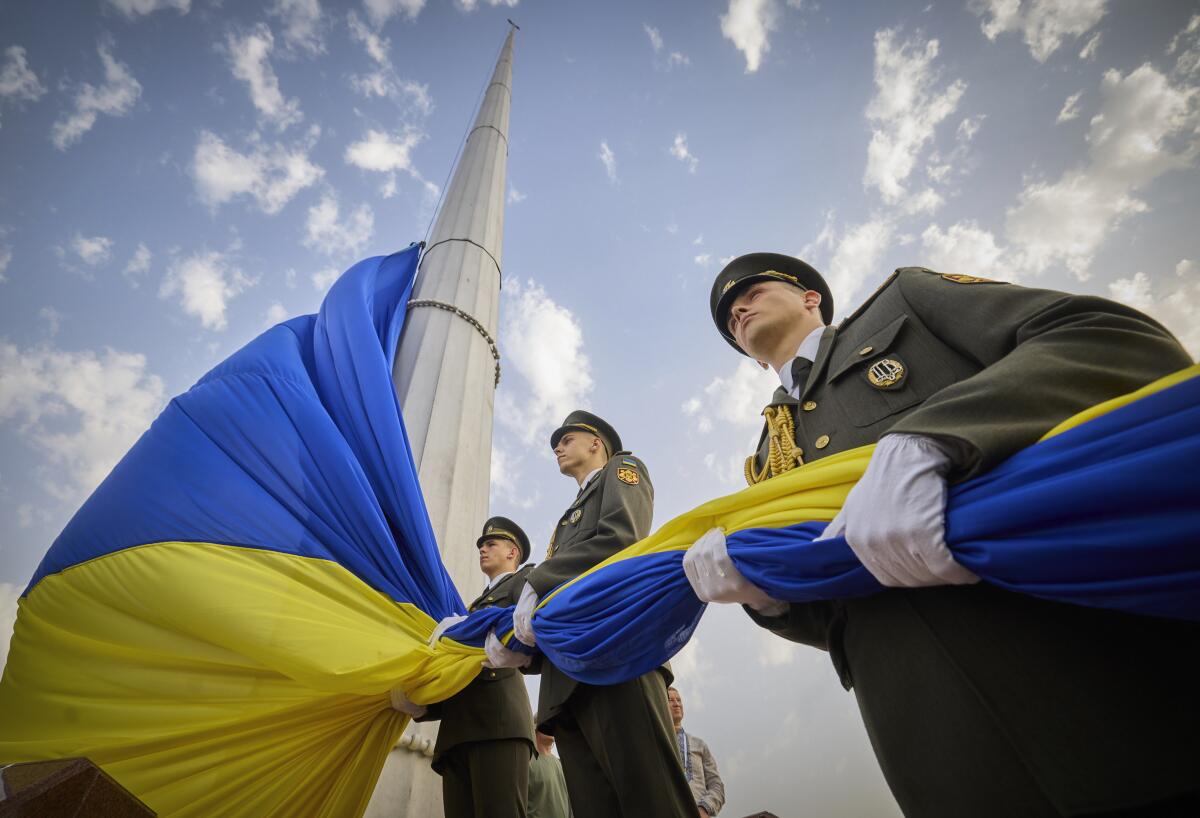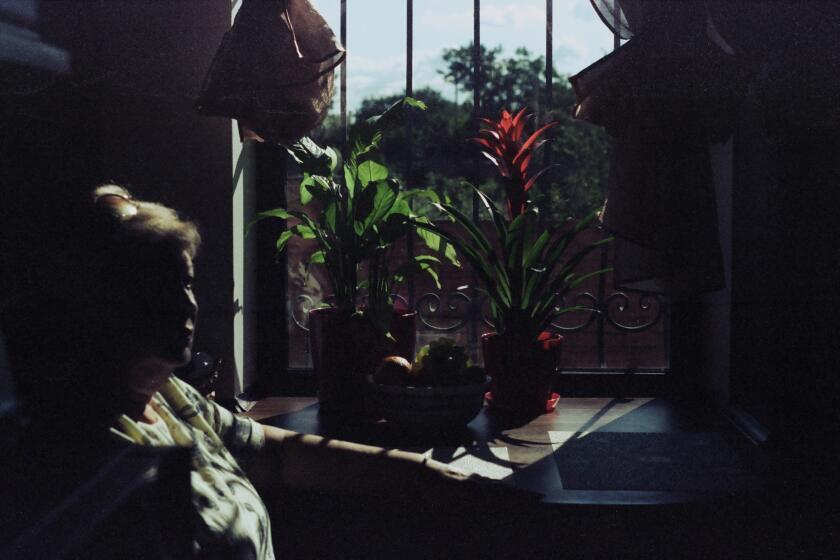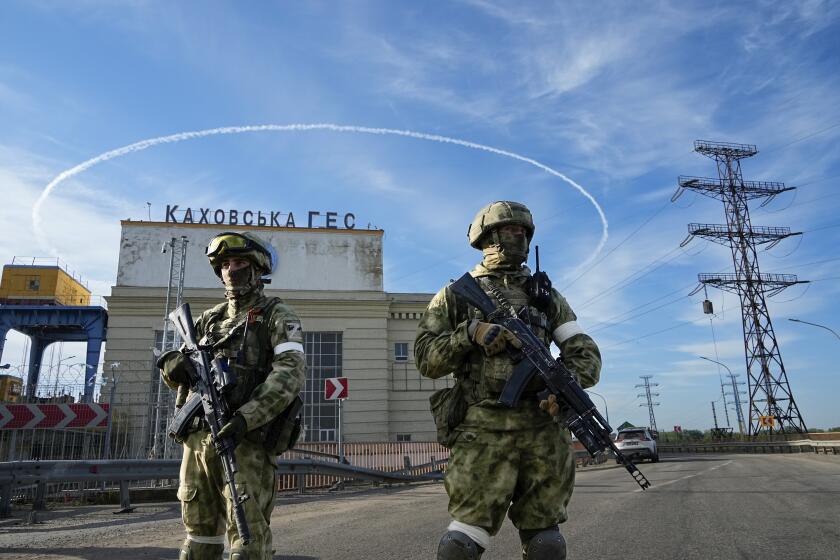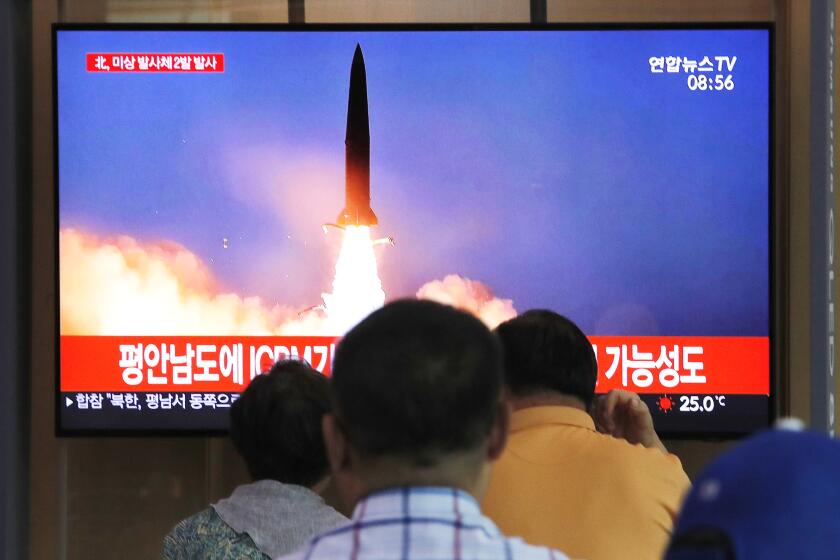On the eve of Ukraine’s national day, fears that Russia will unleash new attacks

- Share via
KYIV, Ukraine — On the eve of Ukraine’s independence day and the half-year mark of Russia’s invasion of its neighbor, warnings that Moscow might plan to disrupt Ukraine’s planned commemorations by attacking significant government and civilian targets caused unease in the war-weary country Tuesday.
The U.S. reinforced those concerns when its embassy in Kyiv issued a security alert, saying it “has information that Russia is stepping up efforts to launch strikes against Ukraine’s civilian infrastructure and government facilities in the coming days.”
The U.S. warning came on the heels of Russia’s claim that Ukrainian intelligence was responsible for a weekend car bombing outside Moscow that killed the daughter of a leading right-wing Russian political theorist. Ukraine denied involvement.
Hundreds of people lined up at a memorial service Tuesday to pay tribute to Darya Dugina, 29, the daughter of Alexander Dugin, a nationalist writer who has been dubbed “Putin’s brain” and “Putin’s Rasputin” because of his purported influence on Russian President Vladimir Putin.
Dugina, a commentator with a Russian TV channel, died when the SUV she was driving blew up Saturday night as she was returning home from the patriotic Tradition festival. Her father, a philosopher who firmly supports Putin’s decision to send troops into Ukraine, was widely believed to be the intended target.
During the memorial service held at a Moscow broadcasting center, Dugin remembered his daughter’s last words to him at Saturday’s festival: “Father, I feel like a warrior. I feel like a hero. I want to be one. I don’t want any different fate. I want to be with my people, with my country,” he recounted.
Ukrainian authorities believe cases of sexual assault by Russian occupiers are vastly underreported. Shame and many factors underlie survivors’ unwillingness to report rapes.
Russia’s accusations that Ukraine was behind Dugina’s killing heightened the apprehension in Ukraine. The Kyiv regional government banned mass events in the capital from Monday through Thursday because of what it said was “the high probability” of Russian missile attacks on the city during the week of Independence Day, spokesperson Kateryna Datsenko said.
The intelligence division of Ukraine’s Defense Ministry also warned Kyiv residents to be cautious, especially on Wednesday — Independence Day — and not to ignore air-raid sirens.
While visiting destroyed Russian tanks and artillery on display near the capital’s main square, resident Vlad Mudrak said he agreed with the ban on mass gatherings.
“Our country is having a very hard time, and we need to be careful,” Mudrak, 26, said Tuesday, which was Ukrainian Flag Day.
Stealth operations and assistance from Ukrainian guerrilla forces pose a growing challenge to Russia’s grip on occupied areas in southeastern Ukraine.
“Look how many weapons they have,” he said, standing next to a burned-out Russia tank and multiple-rocket launcher. “And that’s nothing, not even 1%.”
Ukrainian President Volodymyr Zelensky mentioned the threat potential over the weekend, when he said in a nightly address that “we should be aware that this week Russia may try to do something particularly nasty, something particularly cruel.”
On Tuesday, however, Zelensky stressed defiance rather than fear when he raised the national flag at a memorial.
“The blue-and-yellow flag of Ukraine will again fly where it rightfully should be — in all temporarily occupied cities and villages of Ukraine,” he said, including the Crimean peninsula, which Russia annexed in 2014.
Breaking News
Get breaking news, investigations, analysis and more signature journalism from the Los Angeles Times in your inbox.
You may occasionally receive promotional content from the Los Angeles Times.
One potential target fueling a sense of foreboding is Europe’s largest nuclear power plant, in southeastern Ukraine, where continued shelling and fighting in the area has raised fears of a nuclear catastrophe.
United Nations Secretary-General Antonio Guterres late Monday warned about the nuclear threat in general, particularly since Russia alluded to its massive nuclear arsenal early in the war.
Guterres demanded a halt to “nuclear saber-rattling” on Monday, saying the world was at a “maximum moment of danger” and all countries with nuclear weapons must make a commitment to “no first use.”
That didn’t prevent shelling close to the Zaporizhzhia nuclear plant early Tuesday. Regional Gov. Valentyn Reznichenko said Russian forces fired on nearby Marhanets and Nikopol on the right bank of the Dnieper River, continuing weeks of relentless overnight shelling.
A nuclear conflict involving less than 3% of the world’s stockpiles could kill a third of the world’s population within two years, researchers say.
Another source of concern was the fate of Ukrainian prisoners of war. U.N. High Commissioner for Human Rights Michelle Bachelet said she was “concerned by reports that the Russian Federation and affiliated armed groups in Donetsk are planning — possibly in the coming days — to try Ukrainian prisoners of war.” She said Russia was labeling it an “international tribunal” but that due process and a fair trial would not be guaranteed.
Amid the death and destruction, there was one small point of light. All professional soccer had been stopped in February, but a new league season starts Tuesday in Kyiv.
The Olympic Stadium will see the the opening-day meeting of Shakhtar Donetsk and Metalist 1925 from Kharkiv — teams from eastern cities that are fighting for their very survival.
No fans will be allowed in the 65,000-capacity downtown stadium for the kickoff at 1 p.m. local time, and the players must be rushed to bomb shelters if air-raid sirens sound.
“The teams, the players will be proud of this event,” Shakhtar captain Taras Stepanenko said Monday in a telephone interview with the Associated Press.
More to Read
Sign up for Essential California
The most important California stories and recommendations in your inbox every morning.
You may occasionally receive promotional content from the Los Angeles Times.















